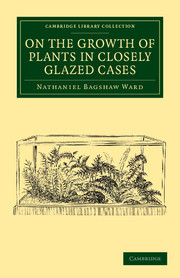Description
On the Growth of Plants in Closely Glazed Cases
Cambridge Library Collection - Botany and Horticulture Series
Author: Ward Nathaniel Bagshaw
First published in 1842, this monograph explores the period's most significant advances in the care and transportation of plants.
Language: English
Subject for On the Growth of Plants in Closely Glazed Cases:
Approximative price 25.19 €
In Print (Delivery period: 14 days).
Add to cart
Publication date: 08-2013
108 p. · 14x21.6 cm · Paperback
108 p. · 14x21.6 cm · Paperback
Description
/li>Contents
/li>
In the early nineteenth century, live plant cuttings were commonly transported between continents in wooden boxes exposed to the elements on the decks of ships; unsurprisingly, it was rare for them to arrive in good health. The glass cases devised by Nathaniel Bagshaw Ward (1791?1868) were a revolutionary step forward in preserving botanical specimens. In this monograph, first published in 1842, Ward explores some of the most common causes of plant deaths in cities and aboard ships, including air quality and temperature. Most importantly, he emphasises the need for light. Although photosynthesis would not be chemically understood until later that century, Ward recognised that a glass case was infinitely preferable to an opaque one. His rapidly adopted invention would have far-reaching effects, allowing for the safe transportation of tea from China to the Himalayas, rubber from the Amazon and medicinal species from the Andes to India.
Preface; 1. On the natural condition of plants; 2. On the causes which interfere with the natural condition of plants; 3. On the imitation of the natural condition of plants in closely-glazed cases; 4. On the conveyance of plants and seeds on ship-board; 5. On the application of the closed plan in improving the condition of the poor; 6. On the probable future application of the proceeding facts; Appendix.
© 2024 LAVOISIER S.A.S.

